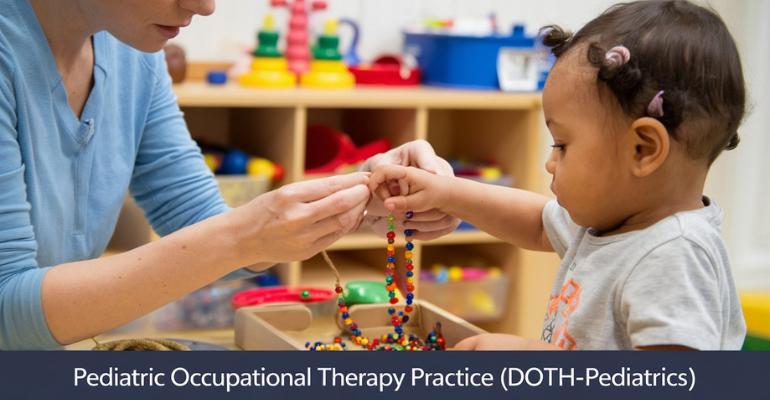
Diploma in Pediatric Occupational Therapy Practice (DOTh-Pediatrics)
The Diploma in Pediatric Occupational Therapy Practice is a specialized one-year program designed to equip occupational and physical therapists with advanced skills in pediatric care. This diploma focuses on assessing and managing developmental, sensory, and motor challenges in children, providing a comprehensive approach to pediatric occupational therapy. The course integrates online theoretical learning with hands-on training through a two-month internship, enabling participants to gain both academic knowledge and practical experience.
With only 30 seats, the course ensures personalized attention, mentoring from top experts, and a well-rounded learning experience. The curriculum is designed to provide 200 hours of intensive training, and upon completion, graduates will receive an internationally recognized certificate.
Who is This Course For?
- 1. Occupational Therapists and Physical Therapists seeking specialization in pediatric therapy.
- 2. Professionals aiming to enhance their expertise in treating developmental and motor disorders in children.
- 3. Therapists working in clinical, educational, or rehabilitation settings who want to focus on pediatric care.
Course Highlights:
- 1. Expert Instruction: Learn from renowned professionals with significant experience in pediatric therapy.
- 2. Hands-On Experience: A 2-month internship provides practical exposure to real-world cases, preparing you for professional practice.
- 3. Comprehensive Training: 200 hours of intensive coursework covering key aspects of pediatric occupational therapy.
- 4. Small Class Size: Limited to 30 participants, ensuring personalized learning and mentorship.
- 5. International Certification: Open up global career opportunities with an internationally recognized diploma.
Key Learning Objectives:
By the end of this program, participants will be able to:
- 1. Assess Pediatric Clients: Conduct comprehensive evaluations of motor, sensory, and cognitive development in children.
- 2. Develop Intervention Plans: Create individualized therapy plans that address the unique needs of pediatric clients.
- 3. Address Sensory and Motor Challenges: Implement evidence-based interventions to improve sensory processing, fine motor skills, and gross motor development.
- 4. Collaborate with Multidisciplinary Teams: Work effectively with educators, healthcare providers, and families to provide holistic care for children with developmental challenges.
- 5. Provide Family-Centered Care: Empower families with tools and strategies to support their child’s development at home and in everyday life.
Curriculum Structure:
-
1. Introduction to Pediatric Occupational Therapy (4 Weeks)
- i). Overview of pediatric occupational therapy practice.
- ii). Key milestones in child development and developmental disorders.
- iii). The role of occupational therapy in supporting children’s growth and independence.
-
2. Developmental Assessments in Pediatric Care (6 Weeks)
- i). Tools for assessing motor, sensory, and cognitive functions in children.
- ii). Administering standardized assessments like the Sensory Integration and Praxis Tests (SIPT) and Peabody Developmental Motor Scales (PDMS).
- iii). Analyzing results to create personalized intervention plans.
-
3. Sensory Processing and Integration Therapy (6 Weeks)
- i). Understanding sensory processing disorders in children.
- ii). Techniques for sensory integration therapy to improve self-regulation, attention, and motor skills.
- iii). Practical strategies for managing sensory challenges in children with autism, ADHD, and other conditions.
-
4. Motor Skill Development and Intervention (6 Weeks)
- i). Fine and gross motor development in children.
- ii). Therapeutic interventions for motor coordination disorders, cerebral palsy, and developmental delays.
- iii). Adaptive techniques and equipment to enhance motor function and independence.
-
5. Pediatric Neurodevelopmental Disorders (4 Weeks)
- i). Overview of common neurodevelopmental conditions such as autism, cerebral palsy, and Down syndrome.
- ii). Role of occupational therapy in managing developmental and cognitive impairments.
- iii). Working with children with complex physical and cognitive needs.
-
6. School-Based Occupational Therapy (4 Weeks)
- i). The role of occupational therapy in school settings.
- ii). Developing Individualized Education Plans (IEP) for children with special needs.
- iii). Collaborating with teachers, school staff, and parents to support children’s educational goals.
-
7. Family-Centered Practice and Advocacy (4 Weeks)
- i). Working with families to create supportive home environments.
- ii). Counseling parents on therapeutic strategies and adaptive techniques.
- iii). Advocacy for children’s rights in healthcare and educational systems.
Internship (2 Months):
- 1. Practical Exposure: Work in pediatric therapy clinics, hospitals, or schools to gain real-world experience.
- 2. Mentorship: Receive one-on-one guidance from seasoned professionals during your internship.
- 3. Hands-On Application: Assess, manage, and treat pediatric cases under expert supervision, applying theoretical knowledge to practice.
Why Choose This Diploma?
- 1. Holistic Pediatric Care: Gain in-depth knowledge of the latest techniques and strategies in pediatric occupational therapy.
- 2. Global Certification: The diploma is internationally recognized, making you eligible for career opportunities worldwide.
- 3. Practical Experience: The internship ensures you leave the course with practical skills and confidence to work in pediatric settings.
- 4. Limited Seats: With only 30 students, each participant receives personalized attention and support.
Career Opportunities:
Upon completion, graduates can pursue careers in:
- 1. Pediatric therapy clinics.
- 2. Hospitals and rehabilitation centers.
- 3. Special education schools.
- 4. Private practice focusing on pediatric clients.
This diploma provides the training necessary to excel in pediatric occupational therapy, enabling therapists to make a significant impact in the lives of children with developmental and sensory challenges.
